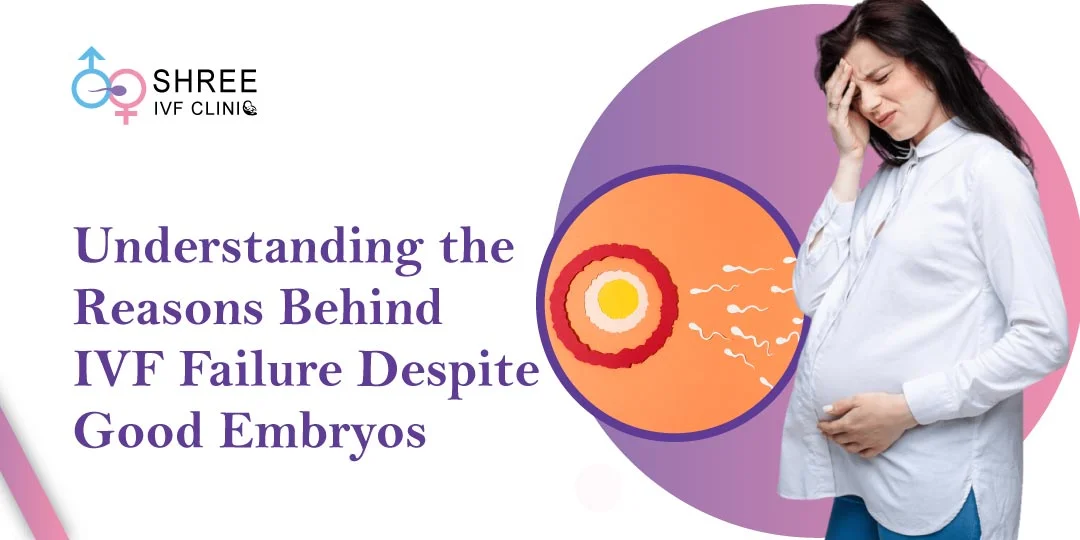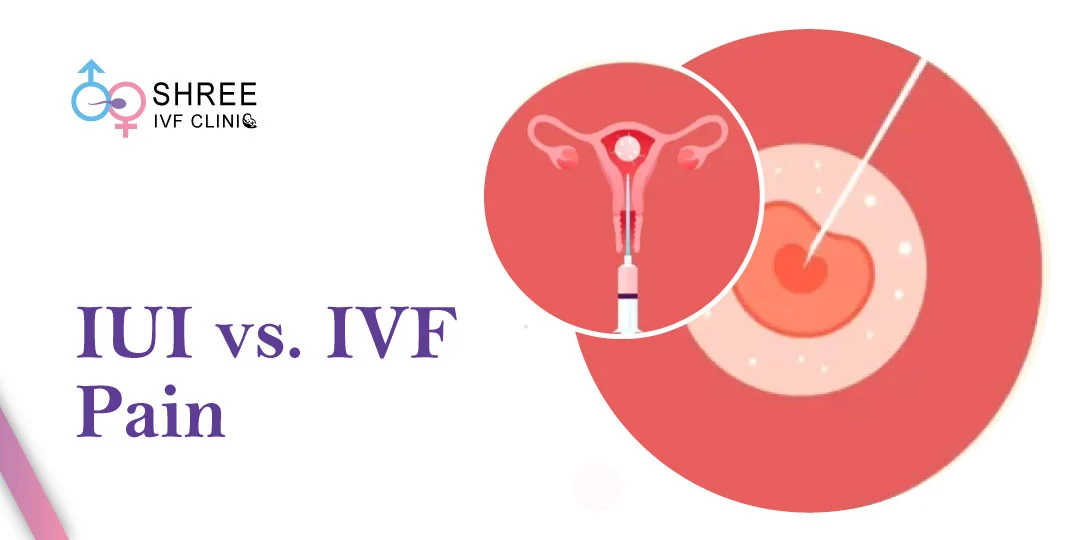Understanding the Reasons Behind IVF Failure Despite Good Embryos
UPDATED ON 29 SEP. 2023
Do you need help understanding why your IVF attempts have been unsuccessful, even with good-quality embryos? This article delves into the possible reasons for IVF failure despite using high-quality embryos.
In vitro fertilisation (IVF) is a widely used fertility treatment method that offers hope to couples trying to conceive. However, the success of IVF is not guaranteed, and various factors can contribute to its failure.
Let’s explore these factors and better understand why IVF may not always result in a successful pregnancy.

AUTHOR
Dr Jay Mehta
Scientific Director & IVF Specialist with 10+ years of experience
TREATMENT
CONDITION
Failed IVF
GET IN TOUCH ON
The IVF Process and Embryo Quality
Before delving into the potential reasons behind IVF failure, let’s first understand the basics of the IVF process and the importance of embryo quality.
In IVF, eggs are retrieved from the ovaries and fertilised with sperm in a laboratory setting.
The resulting embryos are then carefully monitored for their development and quality.
Embryo quality plays a crucial role in the success of IVF, as high-quality embryos have a higher chance of implanting in the uterus and developing into a healthy pregnancy.
Factors Influencing IVF Success
Numerous factors can influence the success of IVF, even when using good-quality embryos. These factors include:
- Uterine Health and Receptivity: The receptivity of the uterus plays a vital role in successful embryo implantation. Issues such as uterine abnormalities, endometrial thickness, or the presence of fibroids can hinder the implantation process.
- Maternal Age and Health: Advanced maternal age is associated with declining egg quality and quantity, making it more challenging for embryos to implant and thrive. Additionally, underlying health conditions such as polycystic ovary syndrome (PCOS), endometriosis, or hormonal imbalances can impact IVF outcomes.
- Sperm Quality: The quality of sperm used during IVF can affect the chances of successful fertilisation and embryo development. Factors such as low sperm count, poor motility, or abnormal morphology can decrease the likelihood of a successful pregnancy.
- Laboratory Conditions During Embryo Culture: The conditions in which embryos are cultured in the laboratory can significantly impact their development. Temperature, pH levels, and culture media composition must be carefully maintained to ensure optimal embryo growth.
- The Skill and Experience of the IVF Team: The expertise and experience of the doctors and embryologists involved in the IVF process play a crucial role in achieving successful outcomes. Proper handling and manipulation of embryos during procedures like embryo transfer can significantly impact the chances of implantation.
Common Reasons for IVF Failure with Good Embryos
Despite using good-quality embryos, IVF can still fail due to various reasons:
- Implantation Issues: Even if embryos are of excellent quality, they may face challenges when it comes to implantation. Factors such as an unfavourable uterine environment, insufficient endometrial lining, or immune system responses can hinder successful implantation.
- Genetic Abnormalities in the Embryo: While embryos may appear of good quality, they can still carry genetic abnormalities that prevent them from developing into a healthy pregnancy. These abnormalities can result from errors during fertilization or genetic issues inherited from the parents.
- Immune System Responses: In some cases, the immune system may mistakenly recognize the embryo as a foreign entity and mount an immune response, leading to embryo rejection and failure.
- Hormonal Imbalances: Imbalances in hormonal levels, both in the mother and the embryo, can impact the implantation process and subsequent pregnancy.
- Stress and Lifestyle Factors: High stress levels, unhealthy lifestyle habits, and certain environmental factors can negatively influence IVF outcomes. It is essential to address these factors and make necessary lifestyle modifications to improve the chances of success.
Diagnostic Techniques and Solutions
Diagnostic techniques like preimplantation genetic testing (PGT) can be employed to address potential issues that may lead to IVF failure.
PGT allows for the screening of embryos for genetic abnormalities before transfer, increasing the chances of selecting healthy embryos.
Specific treatments and interventions can also be tailored to address specific problems identified during IVF.
These may include hormonal supplementation, immune-modulating therapies, or surgical interventions to correct structural abnormalities.

4,790+
379K+
” Every individual and couple’s journey is unique, and
finding the right solutions tailored to their specific
circumstances can make all the difference “
The Role of Emotional Support
Undergoing IVF treatment can be emotionally challenging for individuals and couples. It is crucial to seek emotional support throughout the process.
Counselling services and support groups can provide a safe space to express feelings, cope with stress, and gain valuable insights from others who have experienced similar journeys.
Real-Life Success Stories
While IVF failure can be disheartening, it’s important to remember that many individuals and couples have faced similar challenges and eventually achieved success. Sharing real-life success stories can provide hope and inspiration to those going through the IVF journey.
Hannah and Mark’s story is a testament to perseverance and resilience. After multiple failed IVF attempts with good-quality embryos, they explored additional diagnostic tests to understand the underlying reasons for their struggles.
It was discovered that Hannah had an undiagnosed autoimmune condition affecting implantation. With the guidance of their fertility specialist, they underwent immune-modulating therapy before their next IVF cycle.
This time, the embryos were successfully implanted, resulting in a healthy pregnancy and the birth of their beautiful twins.
Another inspiring success story is that of Sarah and James, who experienced multiple IVF failures despite using top-grade embryos. Determined to uncover the reasons behind their unsuccessful attempts, they underwent preimplantation genetic testing (PGT) on their embryos.
The testing revealed genetic abnormalities that were not detectable by visual inspection alone. With this knowledge, Sarah and James opted for an embryo transfer with a genetically normal embryo, finally achieving their long-awaited pregnancy.
These success stories highlight the importance of personalised treatment approaches and the value of diagnostic techniques in identifying and addressing underlying issues that may contribute to IVF failure.
Every individual and couple’s journey is unique, and finding the right solutions tailored to their specific circumstances can make all the difference.
Conclusion
In conclusion, despite using good-quality embryos, IVF failure can be disheartening, but it’s essential to understand that various factors can contribute to unsuccessful outcomes.
From uterine health and maternal age to sperm quality and laboratory conditions, multiple variables impact the success of IVF. However, through diagnostic techniques, personalised treatments, and emotional support, there is hope for those facing IVF challenges.
If you’re currently going through the IVF journey, it’s crucial to consult with a fertility specialist who can guide you through the process and provide personalised care.
Remember, you are not alone, and many individuals and couples have overcome IVF failures and achieved their dreams of starting or expanding their families.
AUTHOR
Dr Jay Mehta
Scientific Director & IVF Specialist with 10+ years of experience
TREATMENT
CONDITION
Failed IVF
CALL US 24/7 FOR ANY HELP
GET IN TOUCH ON
Share Article on
Recommended Reading
What Are the Side Effects of IVF?
Know the side effects of IVF, from mild pain to hormonal changes, and get expert advice as you start your fertility journey.
After IVF Transfer Pregnancy Symptoms
Learn about early pregnancy signs after embryo transfer, including cramping, spotting or light bleeding, fatigue, breast tenderness, and nausea.
Which is More Painful: IUI or IVF?
Why is IVF generally more painful than IUI? Discover the expert pain management techniques that can help make your experience more comfortable





